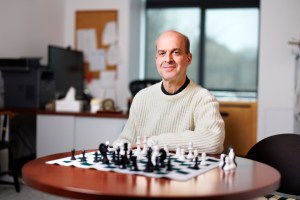Tag: Harvard Medical School
-
Science & Tech
Environmental health researcher studies lead poisoning in India
Lead is a naturally occurring toxic element, and exposure poses a serious threat to children whose neurological systems are still developing. Some children suffer from brain damage, poor motor skills…
-
Health
First indications that aging may be regulated by brain
A little worm called Caenorhabditis elegans was the first creature to have all its genes sequenced, more than 19,000 of them. When the human genome was sequenced, researchers found that…
-
Health
Tiny creatures offer clues to human aging
When its aging gene is not working right, a worm named C. elegans lives three times longer than normal, according to Harvard researcher Gary Ruvkun. The development gene keeps an…
-
Science & Tech
How family leave policies fail working families
In her book, “The Widening Gap: Why American Working Families are in Jeopardy and What Can be Done About It,” S. Jody Heymann of the Harvard School of Public Health…
-
Health
Treating ills with music
The Web site of the American Music Therapy Association lists 57 pages of research articles published in its Journal of Music Therapy and other publications. The articles chronicle successful use…
-
Health
New cancer vaccine being tested
In studies at Beth Israel Deaconess Medical Center and Dana-Farber Cancer Institute in Boston, tumors were eliminated in 25 percent of patients with widespread kidney and lethal skin cancers who…
-
Health
Researchers learn to control dreams
For years, scientists have been stymied in their quest to understand dreams because they are unique events that cannot be replicated.
-
Health
Brain found to play unexpected role in Type II diabetes
Until now, the brain was assumed to be a side player in diabetes. “For the most part, diabetes researchers have not been looking at the brain,” said C. Ronald Kahn,…
-
Health
Sights set on partial corneal transplants
“We don’t have any way of curing these problems,” says Nancy Joyce, a Harvard researcher who is working on saving people’s sight when their corneas deteriorate. “The only way right…
-
Health
Hypnosis found to alter the brain
“Hypnosis has a contentious history,” notes Stephen Kosslyn, professor of psychology at Harvard and leader of a study in which people were hypnotized to see color where only shades of…
-
Health
Tissue engineering produces an artificial gland
Your thymus is a walnut-sized gland that sits just above your heart. The master gland of the immune system, one of the thymus’ chief functions is to produce T lymphocytes,…
-
Science & Tech
Fighting prostate cancer with radioactive seeds
In November 1997, a team of surgeons headed by Anthoy D’Amico, an associate professor of radiation oncology at Harvard Medical School, first used a technique that treats early stages of…
-
Science & Tech
Men have distorted image of what women find attractive
Asked by researchers to choose the bodies they would most like to have, male college students in a study picked computer images with 30 pounds more muscle than they actually…
-
Health
Study points to more targeted use of Ritalin
An area known as the putamen, located deep in the center of the brain, helps to control movement and attention. Harvard researchers believe that the putamen is involved in Attention…
-
Health
Researchers face up to liars
What category of people do you think would be best at detecting lies? It’s not Secret Service agents, or psychiatrists, or even mothers. Investigators working at Massachusetts General Hospital in…
-
Health
Birth of new brain cells induced in birds
Stem cells that are naturally present in the brains of finches were induced to replace lost cells and restore the birds’ ability to sing their distinctive song. “Our results represent…
-
Health
Shadow proteins in thymus may explain how immune system gets to know its own body
Researchers recently identified a protein that appears to work by turning on in the thymus, which lies beneath the breast bone, the production of a wide array of proteins from…
-
Health
Researchers switch cancer off and on in mice
An antibiotic added to the drinking water of mice stops the progress of leukemia. Harvard researcher Claudia Huettner cannot do the same thing in humans, unfortunately, but through such experiments…
-
Science & Tech
Study says children with cancer often suffer needlessly
“Since caregivers are very committed to curing their patients, it may be difficult for them to recognize when to incorporate palliative care into treatments, even when there’s little hope of…
-
Science & Tech
State-of-the-art health guide created
Harvard Medical School believes it has a cure for problems associated with finding accurate, up-to-date medical information: a comprehensive (1,288 pages), $40 medical guide tied to a Web site that…
-
Health
‘Take two aspirin and call me manana’
Harvard Medical School is attempting to bridge the language barriers that sometimes arise in medical settings. A set of three medical phrasebooks was first offered in 1999 in three different…
-
Health
Jolie-Pitt Foundation Donates $2 Million to Global Health Committee to Fight HIV/AIDS and Tuberculosis in Ethiopia
The Global Health Committee (GHC) has announced it will receive $2 million dollars from the Jolie-Pitt Foundation to bring life-saving medicines to Ethiopians suffering from HIV/AIDS and tuberculosis. The money…
-
Health
Electromagnets used in treating depression
Recent studies by Harvard researchers at McLean Hospital in Belmont, Mass., have enlarged the body of knowledge about a promising, though still experimental, treatment for a variety of psychiatric disorders.…


